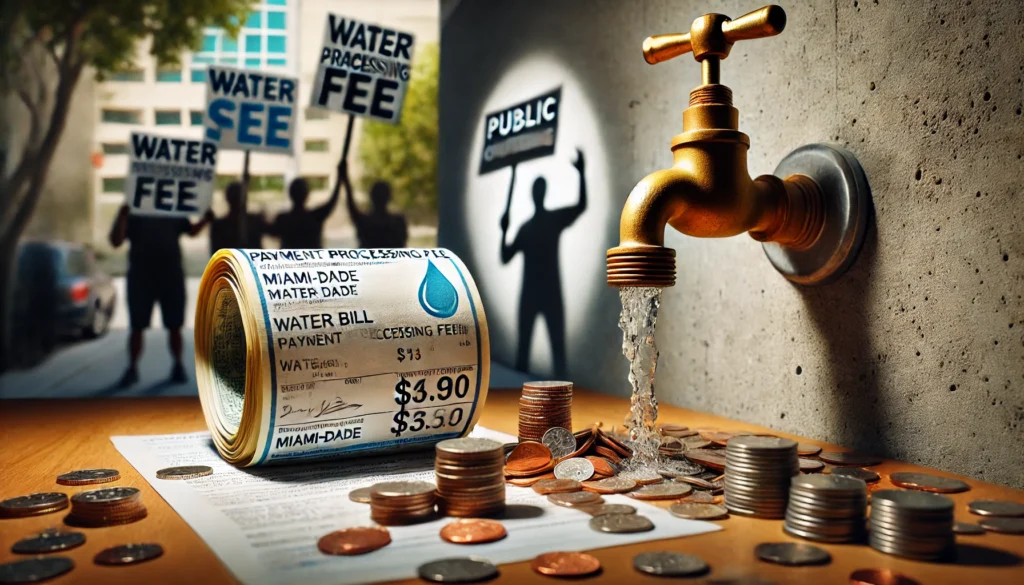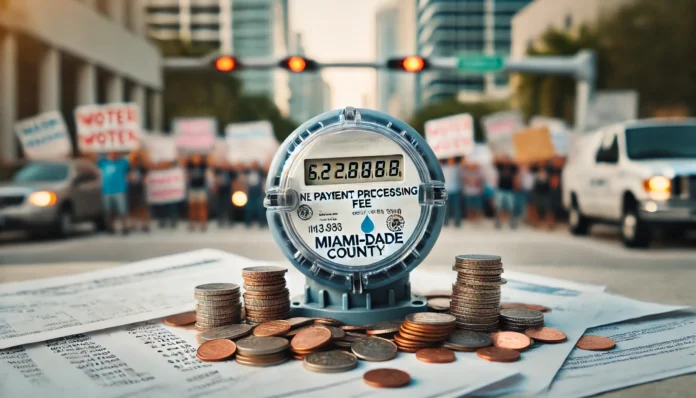|
Getting your Trinity Audio player ready... |
Tabla de Contenido/ Table of Contents
- 1 $5 Increase in (WASD) Rates: $5 increase in Miami-Dade Water and Sewer Department (WASD) rate payment if you use a credit card
- 2 Contract Details and Fee Increase
- 3 Lack of Oversight and Commissioner Unawareness
- 4 Impact on Residents
- 5 Dependency on a Single Provider
- 6 Next Steps and Proposed Solutions
- 7 Frequently Asked Questions (FAQs)
- 7.1 1. Why was ACI allowed to increase fees without consulting county representatives?
- 7.2 2. What happens if the Commission does not approve the fee increase?
- 7.3 3. Does the county have alternatives to ACI’s contract?
- 7.4 4. Are there payment options without additional charges for residents?
- 7.5 5. Can a vendor operating under county jurisdiction make unilateral decisions affecting citizens?
- 7.6 6. How will the county prevent this from happening in the future?
- 8 Conclusion
$5 Increase in (WASD) Rates: $5 increase in Miami-Dade Water and Sewer Department (WASD) rate payment if you use a credit card
The recent renewal of the contract with ACI Payments Inc. and the resulting fee increase for credit card payments in Miami-Dade Water and Sewer Department (WASD) has highlighted structural problems with transparency and governance in the county. Below is a complete account of the case, including statements from public debates and relevant quotes.
Contract Details and Fee Increase
Since 2003, Miami-Dade has used ACI Payments Inc. (formerly Princeton eCom Corp.) to process WASD’s electronic payments. Recently, the contract was extended for an additional one to three years due to the absence of an in-house payment system.
Key Highlights:
- ACI increased the per-transaction fee from $3.95 to $4.49, a 13.7% hike.
- While the county does not directly bear this cost, it impacts residents using credit cards to pay their bills.
Lack of Oversight and Commissioner Unawareness
One concerning aspect is that this fee hike was implemented before the Miami-Dade County Commission formally approved the contract renewal. Commissioner Gonzalez addressed this issue during a commission meeting, expressing frustration:
“In what universe was it acceptable for this company to raise fees without our input on behalf of the taxpayers?”
He also questioned why the contract allowed the company to make decisions affecting residents without prior debate:
“If this is entirely at the discretion of the provider, why are we voting on this? What we vote on has absolutely no impact.”
Impact on Residents
The fee increase primarily affects residents already dealing with high living costs. During the session, concerns were raised about the negative effects on financially vulnerable citizens. Gonzalez emphasized:
“Many of these people don’t even have the money to pay their bills, and now they’re being charged an additional $5.”
Dependency on a Single Provider
The history of the contract with ACI highlights a prolonged dependency on a single provider:
- 2004: ePaybill service added for online payments.
- 2006: Debit card and ATM payment options introduced.
- 2014: Point-of-sale services implemented for in-person payments.
The lack of an in-house system and reliance on a no-bid contract have made it difficult for the county to negotiate more favorable terms.
Next Steps and Proposed Solutions
The County Commission and WASD have identified several actions to address this issue:
- Review of Current Contracts:
County attorneys have confirmed that ACI has the contractual right to adjust fees. However, commissioners are pushing for renegotiations or seeking more cost-effective alternatives. - Request for Proposals (RFP):
WASD plans to issue an RFP in 2024 to explore new technological options, including platforms like Zelle or Venmo, which do not charge convenience fees. - Regulatory Controls:
The county is working on a legislative framework to limit the impact of convenience fees, especially for debit cards, which carry lower associated risks. - Enhanced Transparency:
Stricter policies are being considered to ensure any changes affecting residents are publicly discussed before implementation.

Frequently Asked Questions (FAQs)
1. Why was ACI allowed to increase fees without consulting county representatives?
The current contract permits ACI to adjust fees within certain limits without direct County Commission approval. This has raised concerns about the lack of oversight in such agreements.
2. What happens if the Commission does not approve the fee increase?
The fee increase has already been implemented, so not approving it would not reverse the charges. This highlights the need to renegotiate future contracts to avoid similar situations.
3. Does the county have alternatives to ACI’s contract?
Currently, no. However, WASD plans to issue an RFP to explore new providers and more affordable technologies.
4. Are there payment options without additional charges for residents?
Yes. Residents can pay in cash or mail checks, which do not have convenience fees. However, these options may not be practical for all users.
5. Can a vendor operating under county jurisdiction make unilateral decisions affecting citizens?
While legally permitted in this case, commissioners have pointed out that this practice is problematic and are working to implement measures to limit vendor discretion.
6. How will the county prevent this from happening in the future?
The county is reviewing existing contracts and working on new regulations to ensure better oversight and control over decisions impacting residents.
Conclusion
The WASD fee increase reveals weaknesses in administrative oversight and emphasizes the importance of ensuring decisions affecting residents are approved by elected representatives. This case underscores the urgent need to adopt measures that enhance transparency, reduce dependency on single vendors, and safeguard citizens’ financial interests.
Full Video of the Miami-Dade County Commissioners Meeting
📢 Attention, Miami-Dade! 📢
Getting involved in local politics is more important than it seems. The decisions made by our local representatives have a direct and profound impact on our daily lives. From the infrastructure we use, like roads and parks, to essential services such as housing, transportation, education, and safety, everything depends on the actions we take as a community. Local politics is in our hands and affects every aspect of our reality!
Want more post like this?
Head over to our homepage for the latest updates from South Florida and beyond:











